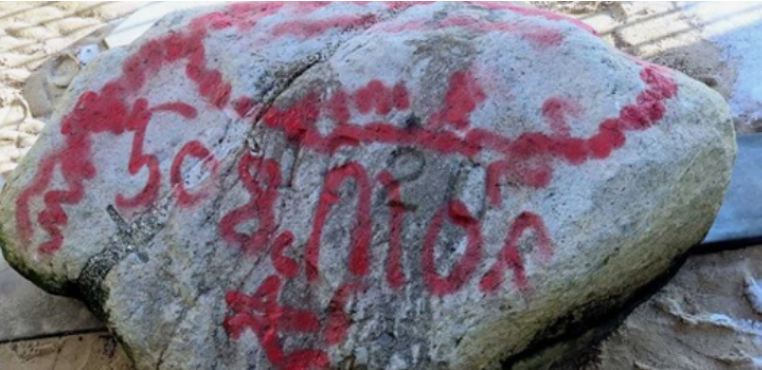
- Details
- By Levi Rickert
PLYMOUTH, Mass. — The townspeople of Plymouth, Mass. woke up on Presidents Day to discover vandals had sprayed graffiti with red paint on the Plymouth Rock and other landmarks in the coastal town.
The town is set to commemorate the 400th anniversary of the arrival of the Mayflower and landing of the Pilgrims this April.
Plymouth’s Police Chief Michael Botieri said Plymouth Rock, the Pilgrim Maiden statue and a memorial granite bench across the street from Plymouth Rock and at least four other statues located along the waterfront were damaged by spray paint.
The inscribed “1620” on Plymouth Rock commemorating the Pilgrims’ landing was covered with red spray paint. The graffiti includes some obscene messages. Most of the graffiti was smeared and indecipherable, according to Botieri. On Monday, detectives were reviewing surveillance cameras to see if they could identify those responsible for the vandalism.
For decades, Plymouth Rock has been the site of protests by American Indians on Thanksgiving Day.
“I have no idea of who was involved, just that it was defaced. What I can tell you is that etched in the stone is the date 1620. From an indigenous perspective that is defacement of a perfectly innocent hunk of granite. It marks a very convenient year for the casual consumers of feel-good history, the year of the arrival of founders of this nation. But it fails to recognize that they were actually takers,” Paula Peters, a journalist and tribal citizen of the Wampanoag Tribe, explained to Native News Online in an email Monday evening.
“It fails to recognize the sacrifices of the Wampanoag who were kidnapped, who died of plagues introduced by old world interlopers, who were duped by disingenuous settlers. The “rock” symbolizes lies Americans have been told for four centuries.”
The red paint was removed from the images by late Monday morning.
More Stories Like This
Native News Weekly (August 25, 2024): D.C. BriefsUS Presidents in Their Own Words Concerning American Indians
Native News Weekly (December 14, 2025): D.C. Briefs
Wounded Knee Massacre Site Protection Bill Passes Congress
Two Murdered on Colville Indian Reservation
Help us defend tribal sovereignty.
At Native News Online, our mission is rooted in telling the stories that strengthen sovereignty and uplift Indigenous voices — not just at year’s end, but every single day.
Because of your generosity last year, we were able to keep our reporters on the ground in tribal communities, at national gatherings and in the halls of Congress — covering the issues that matter most to Indian Country: sovereignty, culture, education, health and economic opportunity.
That support sustained us through a tough year in 2025. Now, as we look to the year ahead, we need your help right now to ensure warrior journalism remains strong — reporting that defends tribal sovereignty, amplifies Native truth, and holds power accountable.
 The stakes couldn't be higher. Your support keeps Native voices heard, Native stories told and Native sovereignty defended.
The stakes couldn't be higher. Your support keeps Native voices heard, Native stories told and Native sovereignty defended.
Stand with Warrior Journalism today.
Levi Rickert (Potawatomi), Editor & Publisher

